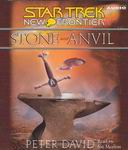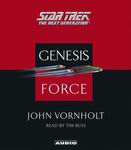
 Alien Voices: The Invisible Man
Alien Voices: The Invisible Man
By H.G. Wells; Performed by John de Lancie, Leonard Nimoy and a full cast
2 Cassettes or 2 CDs – Approx. 114 minutes [UNABRIDGED DRAMATIZATION]
Publisher: Simon & Schuster Audio
Published: 1998
ISBN: 067158104X (Cassette); 0671581058 (CD)
Themes: / Science Fiction / Invisibility / Fantasy / Star Trek / Classic / Philosophy /
One of Science Fiction’s seminal works is The Invisible Man by H.G. Wells. It’s premise is intriguing. What would it be like to be hidden from view? At first, there would be the advantage of watching others without being noticed. But, what would you do when the novelty wore off and the invisibility didn’t? Would you become a prisoner of your own freedom? Or perhaps a madman bent on enslaving others?The novel was written in 1897 when the world believed that science could cure all ills, but as we will glean from the story of The Invisible Man, the achievements of the human mind are worthless without a human soul to guide them. Come with us now, as Alien Voices explores the tragic life of a young scientist who seemed to be on the threshold of a brilliant future and something quite unexpected happens.
This loose adaptation of H.G. Wells‘ The Invisible Man is quite…fascinating. It has been adapted in the style of an old time radio drama, the majority of the plot is there, but it has been compressed and massaged to fit the actors and sensibilities of the Alien Voices team. Alien Voices formed in 1996 to create multi-media works of science fiction and fantasy, drawing upon the copyright expired classics and the languishing resources of the Star Trek alumni. Its three founding members are actor/director Leonard Nimoy, actor/director/writer John de Lancie, and writer/producer Nat Segaloff. de Lancie and Nimoy headline the dramas, in this case playing the title character and his university professor respectively. The rest of the cast is rounded out by: Susan Bay, Richard Doyle, Robert Ellenstein, Jerry Hardin, Marnie Mosiman, Kate Mulgrew, Ethan Phillips, Dwight Schultz and Nana Visitor.
This production is very good, the sound effects, voice talent and music are all very well done. The script is quite different from the original novel, but those modifications are very well done. The packaging is merely adequate, a traditional cd jewel case, a cardboard box and some quickie photoshop art. But most conspicuous by its absence is a cast and character list. The cast is named at the end of the program, but we are never told which actor is playing which character. It is easy to tell Ethan Phillips and Nana Visitor, but its hard to identify many of the others. Of the other actors the only one who sounded at all familiar was one who sounded like Mark Twain. A little investigation, and I determined that it was likely Jerry Hardin who played Twain in Star Trek: The Next Generation‘s two part episode Time’s Arrow!
The story itself has been modified and compressed, most of the original Wells’ version of The Invisible Man remains in this production. H.G. Wells is best remembered for The War Of The Worlds, which itself was adapted very early on by Mercury Theater and Orson Welles. That adaptation and a later film version had a lasting impact upon popular culture, making the idea of “alien invasion” almost synonymous science fiction, at least to the majority who don’t read it. But science fiction isn’t always about the future, or about space travel, or aliens invading the Earth. Sometimes it is subtler, and in the case of The Invisible Man, it proves itself deeply rooted in philosophy.
Those who examine science fiction closely will see a profound connection between science and philosophy. In the case of The Invisible Man, Wells started to explore what would be necessary for invisibility to work, (for it to be rooted in science and not merely magic), AND to explore the consequences of invisibility actually working. But Wells himself was drawing upon resources of an even earlier time. In the philosopher Plato’s famous book The Republic (itself a work of proto-science fiction), we are introduced to Gyges, a shepherd who finds a magic ring which can turn him invisible. Gyges soon discovers that he can act unjustly without anyone knowing. For Plato this was a story to make us think about what being just and injust really is. For Wells and Alien Voices it is more about telling a good story. But a little philosophy does manage to sneak into the plot; For the Invisible Man, invisibility is power, and possessing that power he can do a great many things, like get revenge. But revenge is hindered by a few stumbling blocks, first he has to go out naked, his clothing isn’t invisible so he can’t wear it. He can’t eat or smoke or walk in dusty areas, all of those things make him visible. Also he can’t carry anything, so if he steals money (he can’t earn it), it appears to float about of its own accord, making people chase after him! It is almost as bad as king Midas’s dilemma, like Midas, The Invisible Man got his wish but it isn’t quite working out for him. Dust and moisture make his body visible in a ghostly way. His footprints appear in the dirt and snow. Oh yes and the small matter that the accumulated effect of these things has driven him to the edge of madness.
I liked the story, but I was constantly reminded of one glaring problem not mentioned in production. Wouldn’t an invisible man also be blind? If his corneas are absolutely transparent and his retinas are absolutely transparent, how would light be turned into mental images? The answer…. they wouldn’t be! An invisible man would be blind! For us to see the world a fraction of the light that hits our retina must be absorbed into our rods and cones, our corneas must focus the light. This issue made the whole story so implausible, in my mind it made me question whether this was science fiction at all! Thankfully I got over it. And have come to realize that even if it is flawed by this oversight, at least it demonstrates that philosophical fiction like all good science fiction is able to make us think out problems that don’t seem obvious at first. Who’d have thought invisibility would require blindness? Not me, at least not before listening to Alien Voices: The Invisible Man.
posted by Jesse Willis

 Koko
Koko Captain’s Blood
Captain’s Blood Star Trek New Frontier: Stone and Anvil
Star Trek New Frontier: Stone and Anvil Alien Voices: The Invisible Man
Alien Voices: The Invisible Man Star Trek: The Next Generation: Genesis Force
Star Trek: The Next Generation: Genesis Force